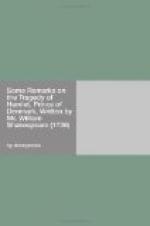The whole Discourse concerning the great Preparations making in Denmark is very Poetical, and necessary also towards the introducing of Fortinbrass in this Play, whose Appearance gives Rise to one Scene, which adds a Beauty to the Whole; I mean, That wherein Hamlet makes those noble Reflections upon seeing That Prince’s Army. Besides, this Discourse is necessary also to give the Ghost Time to appear again, in order to affect the Spectators still more; and from this Conversation the Interlocutors draw one Reason, why the Spirit appears in Arms, which appears rational to the Audience. It gives also Horatio an Opportunity of addressing the Ghost in that beautiful Manner he does.
Page 229
Stay Illusion! &c.
The Description of the Prefages which happen’d to Rome, and the drawing a like Inference from this supernatural Appearance, is very nervous and Poetical.
Page 230, 231.
Bernardo. It was about to speak when the Cock crew &c.
The Speeches in consequence of this Observation are truly beautiful, and are properly Marks of a great Genius; as also these Lines which describe the Morning, are in the true Spirit of Poetry.
Page 31. But, look, the Morn, in Russet Mantle clad, Walks oe’r the Dew of yon high Eastern Hill.
And as to Shakespeare’s complying with the vulgar Notions of Spirits amongst the English at that Time, so far from being low, it adds a Grace and a Naivete to the whole Passage, which one can much easier be sensible of than know how to make others so.
SCENE. The Palace, (p. 231.) And Sequel.
Enter the King, Queen, Hamlet, &c.
It is very natural and apropos, that the King should bring some plausible Excuse for marrying his Brother’s Wife so soon after the Decease of his Brother, which he does in his first Speech in this Scene: It would else have too soon revolted the Spectators against such an unusual Proceeding. All the Speeches of the King in this Scene to his Ambassadors Cornelius and Voltimand, and to Laertes, and to Prince Hamlet, are entirely Fawning, and full of Dissimulation, and makes him well deserve the Character which the Prince afterwards gives him, of smiling, damn’d Villain, &c. when he is informed of his Crime.
The King’s and Queen’s Questions to Hamlet are very proper, to give the Audience a true Idea of the Filial Piety of the young Prince, and of his virtuous Character; for we are hereby informed of his fixed and strong Grief for the Loss of his Father: For it does not appear, that the Usurpation of the Crown from him, sits heavy on his Soul, at least, it is not seen by any Part of his Behaviour.
How his Uncle came to be preferred to him, we are left entirely in the dark, but may suppose it to have been done in the same Manner, as several things of the like Nature have been effected, viz. by Corruption and Violence, and perhaps upon the Pretence of the Prince’s being too young.




